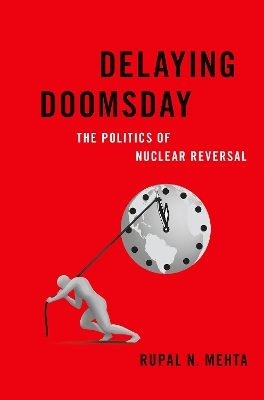
Delaying Doomsday
Oxford University Press Inc (Verlag)
978-0-19-007797-6 (ISBN)
This book looks at the experiences of countries that ventured down the path of nuclear proliferation but were stopped short, and examines how the international community bargains with proliferators to encourage nuclear reversal. It asks why so many states have relented to pressure to abandon their nuclear weapons programs, and which counterproliferation policies have been successful. Rupal N. Mehta argues that the international community can persuade countries to reverse their weapons programs with rewards and sanctions especially when the threat to use military force remains "on the table". Specifically, nuclear reversal is most likely when states are threatened with sanctions and offered face-saving rewards that help them withstand domestic political opposition. Historically, the United States has relied on a variety of policy levers--including economic and civilian nuclear assistance and, sometimes, security guarantees, as well as economic sanctions--to achieve nuclear reversal. Underlying these negotiations is the possibility of military intervention, which incentivizes states to accept the agreement (often spearheaded by the United States) and end their nuclear pursuit.
The book draws on interviews with current and former policymakers, as well as in-depth case studies of India, Iran, and North Korea, to provide policy recommendations on how best to manage nuclear proliferation challenges from rogue states. It also outlines the proliferation horizon, or the set of state and non-state actors that are likely to have interest in acquiring nuclear technology for civilian, military, or unknown purposes. The book concludes with implications and recommendations for U.S. and global nuclear counterproliferation policy.
Rupal N. Mehta is an Assistant Professor in the Department of Political Science at the University of Nebraska-Lincoln. Previously, she was a Stanton Nuclear Security Postdoctoral Fellow in the Belfer Center at Harvard University's Kennedy School of Government. She holds a Ph.D. in Political Science from the University of California, San Diego. Her research interests lie in international security, with a specialization in nuclear proliferation, extended deterrence, and nuclear latency. Her work has appeared in Journal of Conflict Resolution, International Studies Quarterly, Journal of Strategic Studies, The Washington Quarterly, and the Washington Post's Monkey Cage.
CHAPTER 1: THE PUZZLE OF COUNTERPROLIFERATION
CHAPTER 2: THEORY OF NUCLEAR REVERSAL
OVERVIEW: INTRODUCING THE EVIDENCE
CHAPTER 3: EVIDENCE FROM THE HISTORICAL RECORD
CHAPTER 4: SUCCESS AND FAILURE IN NUCLEAR REVERSAL
CHAPTER 5: INDIA--ERSTWHILE ALLY AND NUCLEAR REVERSAL
CHAPTER 6: IRAN--ADVERSARIES AND NUCLEAR REVERSAL
CHAPTER 7: NORTH KOREA--THE REMAINING CHALLENGE
CHAPTER 8: LESSONS LEARNED--NUCLEAR REVERSAL, INTERNATIONAL RELATIONS, AND FUTURE CHALLENGES
References
Index
| Erscheinungsdatum | 31.12.2019 |
|---|---|
| Reihe/Serie | Bridging the Gap |
| Verlagsort | New York |
| Sprache | englisch |
| Maße | 160 x 236 mm |
| Gewicht | 567 g |
| Themenwelt | Sozialwissenschaften ► Politik / Verwaltung ► Europäische / Internationale Politik |
| Wirtschaft | |
| ISBN-10 | 0-19-007797-2 / 0190077972 |
| ISBN-13 | 978-0-19-007797-6 / 9780190077976 |
| Zustand | Neuware |
| Haben Sie eine Frage zum Produkt? |
aus dem Bereich


